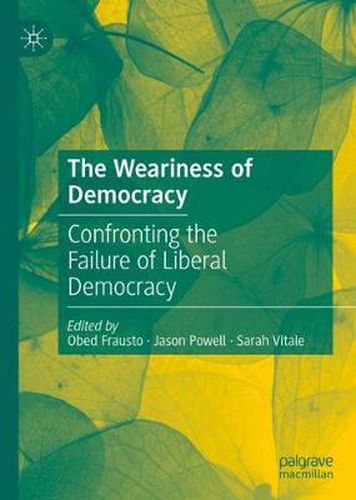Readings Newsletter
Become a Readings Member to make your shopping experience even easier.
Sign in or sign up for free!
You’re not far away from qualifying for FREE standard shipping within Australia
You’ve qualified for FREE standard shipping within Australia
The cart is loading…






This title is printed to order. This book may have been self-published. If so, we cannot guarantee the quality of the content. In the main most books will have gone through the editing process however some may not. We therefore suggest that you be aware of this before ordering this book. If in doubt check either the author or publisher’s details as we are unable to accept any returns unless they are faulty. Please contact us if you have any questions.
Liberal democracy today, having aligned itself with capitalism, is producing a generalized feeling of weariness and disillusionment with government among the citizenry of many countries. Because of a decades-long march of globalized capitalism, economic oligarchies have gained oppressive levels of political power, and as a result, the economic needs of many people around the world have been neglected. It then becomes essential to remember that our ability to change society emerges from our power to formulate different questions; or, in this case, alternative understandings of democracy. This book draws together a variety of alternative theories of democracies in a quest to expose readers to a selection of the most exciting and innovative new approaches to politics today. The consideration of these leading alternative conceptualizations of democracy is important, as it is now common to see xenophobic and racist rhetoric using the platform of liberal democracy to threaten ideas of plurality, diversity, equality, and economic justice. In looking at four different models of democracy (utopian democracy, radical democracy, republican democracy, and plural democracy) this book argues that encounters with alternate conceptualizations of democracy is necessary if citizens and scholars are going to understand the constellation of possibilities that exist for inclusive, plural, economically equal, and just societies.
$9.00 standard shipping within Australia
FREE standard shipping within Australia for orders over $100.00
Express & International shipping calculated at checkout
This title is printed to order. This book may have been self-published. If so, we cannot guarantee the quality of the content. In the main most books will have gone through the editing process however some may not. We therefore suggest that you be aware of this before ordering this book. If in doubt check either the author or publisher’s details as we are unable to accept any returns unless they are faulty. Please contact us if you have any questions.
Liberal democracy today, having aligned itself with capitalism, is producing a generalized feeling of weariness and disillusionment with government among the citizenry of many countries. Because of a decades-long march of globalized capitalism, economic oligarchies have gained oppressive levels of political power, and as a result, the economic needs of many people around the world have been neglected. It then becomes essential to remember that our ability to change society emerges from our power to formulate different questions; or, in this case, alternative understandings of democracy. This book draws together a variety of alternative theories of democracies in a quest to expose readers to a selection of the most exciting and innovative new approaches to politics today. The consideration of these leading alternative conceptualizations of democracy is important, as it is now common to see xenophobic and racist rhetoric using the platform of liberal democracy to threaten ideas of plurality, diversity, equality, and economic justice. In looking at four different models of democracy (utopian democracy, radical democracy, republican democracy, and plural democracy) this book argues that encounters with alternate conceptualizations of democracy is necessary if citizens and scholars are going to understand the constellation of possibilities that exist for inclusive, plural, economically equal, and just societies.